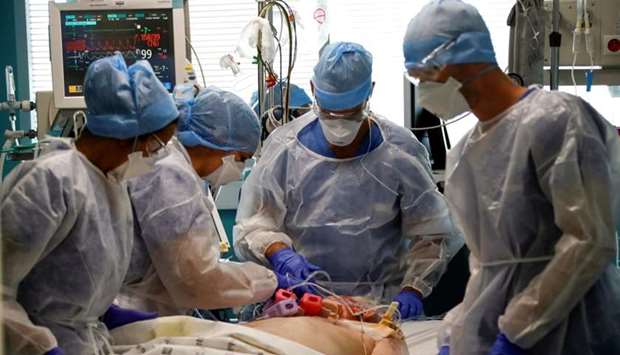European countries from Denmark to Greece have announced new restrictions to curb surging coronavirus infections in some of their largest cities, while Britain is considering new measures to tackle an "inevitable" second wave of Covid-19.
Europe* A sudden jump in France's daily death toll from Covid-19 stems from previously unreported cases in one hospital near Paris, according to statements by health authorities. The health ministry reported on Friday that the total number of deaths from Covid-19 increased by 154 to 31,249, a four-month high in the daily death toll and triple the levels of the past week.
* Resurgent coronavirus cases in Turkey are fuelling tensions between doctors who say the official figures underplay the scale of the outbreak and politicians who accuse the country's medical association of undermining efforts to contain it.
* Britain is likely to need to reintroduce some national coronavirus lockdown measures sooner rather than later, a former senior government health advisor said on Saturday. Prime Minister Boris Johnson said on Friday that he did not want another national lockdown but that new restrictions may be needed because the country was facing an "inevitable" second wave of Covid-19.
* Russia reported 6,065 new coronavirus cases on Saturday, the first time the daily tally has been higher than 6,000 in two months. The national tally of infections rose to 1,097,251.
* The regional government of the Spanish capital Madrid ordered a lockdown from Monday in some of the poorer areas of the city and its outskirts that are home to about 850,000 people.
Asia-Pacific
* Victoria, the Australian state at the centre of the country's coronavirus outbreak, on Saturday reported its lowest daily increase of infections in three months, putting it on course to relax a hard lockdown in its capital Melbourne by the end of the month.
* India's parliament session that began this week is likely to be cut short after 30 lawmakers were found infected with the coronavirus, two senior parliament officials said, as the number of cases in the country rose to 5.3 million.
* The Philippines' health ministry on Saturday reported 3,962 new coronavirus infections and 100 additional deaths, with both numbers the highest in five days. Philippine President Rodrigo Duterte has decided to retain the 1 metre (three feet) social distance requirement on public transport to reduce coronavirus infecions, rejecting moves to reduce it to 30 centimetres (12 inches), his spokesman said.
Americas
* New leader of Canada's main opposition Conservative Party, Erin O'Toole, tested positive for coronavirus on Friday, the party said in a statement.
* President Donald Trump said on Friday he expects to have available enough doses of a coronavirus vaccine for every American by April.
* The Trump administration reversed guidance on Covid-19 testing for a second time, urging those exposed to people with the virus to get tested even if they are not displaying symptoms.
Middle East and Africa
* Morocco signed a deal with Russia's R-Pharm to buy a Covid-19 vaccine produced under a licence from Britain’s AstraZeneca, the health ministry said, as its total number of cases approached 100,000.
* Israel entered a second nationwide lockdown at the onset of the Jewish high-holiday season, forcing residents to stay mostly at home amid a resurgence in new coronavirus cases.
Medical developments
* Moderna Inc said it was on track to produce 20 million doses of its experimental coronavirus vaccine by the end of the year, while maintaining its goal of readying 500 million to 1 billion doses in 2021.
Economic impact
* Germany would relax insolvency rules under proposals set out on Saturday to help avert a wave of bankruptcies in Europe's biggest economy, provided companies hit by the coronavirus crisis have a robust business model.
* Global equity markets slid as investors sought direction after this week's U.S. Federal Reserve meeting and a jump in coronavirus cases in Europe rattled sentiment, while gold rose and safe-haven buying lifted the Japanese yen.
* Hungary will extend a moratorium on loan repayments for some households and companies until the middle of 2021, as its finance minister warned the economy could struggle to grow next year unless a coronavirus vaccine is found.

